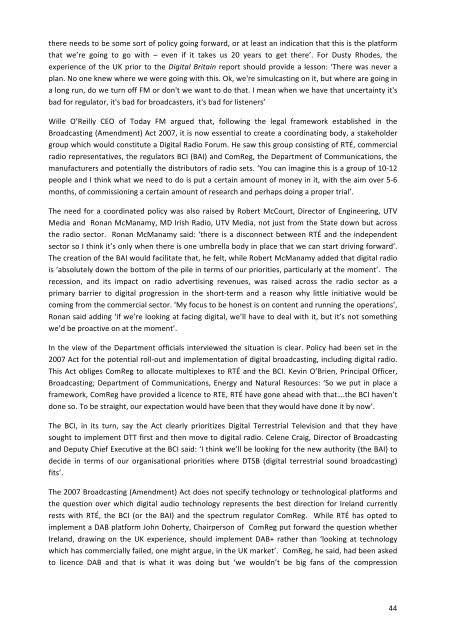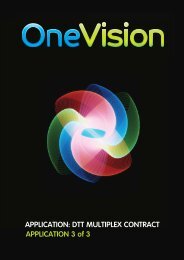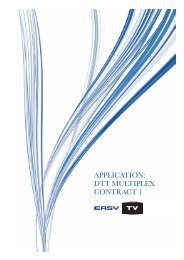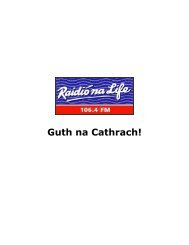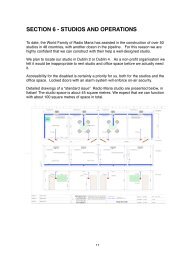Digital Radio for Ireland: Competing Options, Public Expectations - BCI
Digital Radio for Ireland: Competing Options, Public Expectations - BCI
Digital Radio for Ireland: Competing Options, Public Expectations - BCI
Create successful ePaper yourself
Turn your PDF publications into a flip-book with our unique Google optimized e-Paper software.
there needs to be some sort of policy going <strong>for</strong>ward, or at least an indication that this is the plat<strong>for</strong>m <br />
that we’re going to go with – even if it takes us 20 years to get there’. For Dusty Rhodes, the <br />
experience of the UK prior to the <strong>Digital</strong> Britain report should provide a lesson: ‘There was never a <br />
plan. No one knew where we were going with this. Ok, we're simulcasting on it, but where are going in <br />
a long run, do we turn off FM or don't we want to do that. I mean when we have that uncertainty it's <br />
bad <strong>for</strong> regulator, it's bad <strong>for</strong> broadcasters, it's bad <strong>for</strong> listeners’ <br />
Wille O’Reilly CEO of Today FM argued that, following the legal framework established in the <br />
Broadcasting (Amendment) Act 2007, it is now essential to create a coordinating body, a stakeholder <br />
group which would constitute a <strong>Digital</strong> <strong>Radio</strong> Forum. He saw this group consisting of RTÉ, commercial <br />
radio representatives, the regulators <strong>BCI</strong> (BAI) and ComReg, the Department of Communications, the <br />
manufacturers and potentially the distributors of radio sets. ‘You can imagine this is a group of 10‐12 <br />
people and I think what we need to do is put a certain amount of money in it, with the aim over 5‐6 <br />
months, of commissioning a certain amount of research and perhaps doing a proper trial’. <br />
The need <strong>for</strong> a coordinated policy was also raised by Robert McCourt, Director of Engineering, UTV <br />
Media and Ronan McManamy, MD Irish <strong>Radio</strong>, UTV Media, not just from the State down but across <br />
the radio sector. Ronan McManamy said: ‘there is a disconnect between RTÉ and the independent <br />
sector so I think it’s only when there is one umbrella body in place that we can start driving <strong>for</strong>ward’. <br />
The creation of the BAI would facilitate that, he felt, while Robert McManamy added that digital radio <br />
is ‘absolutely down the bottom of the pile in terms of our priorities, particularly at the moment’. The <br />
recession, and its impact on radio advertising revenues, was raised across the radio sector as a <br />
primary barrier to digital progression in the short‐term and a reason why little initiative would be <br />
coming from the commercial sector. ‘My focus to be honest is on content and running the operations’, <br />
Ronan said adding ‘if we’re looking at facing digital, we’ll have to deal with it, but it’s not something <br />
we’d be proactive on at the moment’. <br />
In the view of the Department officials interviewed the situation is clear. Policy had been set in the <br />
2007 Act <strong>for</strong> the potential roll‐out and implementation of digital broadcasting, including digital radio. <br />
This Act obliges ComReg to allocate multiplexes to RTÉ and the <strong>BCI</strong>. Kevin O’Brien, Principal Officer, <br />
Broadcasting; Department of Communications, Energy and Natural Resources: ‘So we put in place a <br />
framework, ComReg have provided a licence to RTE, RTÉ have gone ahead with that….the <strong>BCI</strong> haven’t <br />
done so. To be straight, our expectation would have been that they would have done it by now’. <br />
The <strong>BCI</strong>, in its turn, say the Act clearly prioritizes <strong>Digital</strong> Terrestrial Television and that they have <br />
sought to implement DTT first and then move to digital radio. Celene Craig, Director of Broadcasting <br />
and Deputy Chief Executive at the <strong>BCI</strong> said: ‘I think we’ll be looking <strong>for</strong> the new authority (the BAI) to <br />
decide in terms of our organisational priorities where DTSB (digital terrestrial sound broadcasting) <br />
fits’. <br />
The 2007 Broadcasting (Amendment) Act does not specify technology or technological plat<strong>for</strong>ms and <br />
the question over which digital audio technology represents the best direction <strong>for</strong> <strong>Ireland</strong> currently <br />
rests with RTÉ, the <strong>BCI</strong> (or the BAI) and the spectrum regulator ComReg. While RTÉ has opted to <br />
implement a DAB plat<strong>for</strong>m John Doherty, Chairperson of ComReg put <strong>for</strong>ward the question whether <br />
<strong>Ireland</strong>, drawing on the UK experience, should implement DAB+ rather than ‘looking at technology <br />
which has commercially failed, one might argue, in the UK market’. ComReg, he said, had been asked <br />
to licence DAB and that is what it was doing but ‘we wouldn’t be big fans of the compression <br />
44


